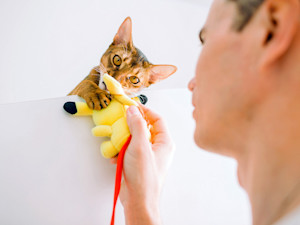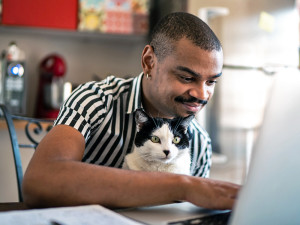Our Pet Loves Me But Ignores My Partner – What Can the ‘Spare Human’ Do?
Spare human syndrome? Here’s how to win your pet’s love
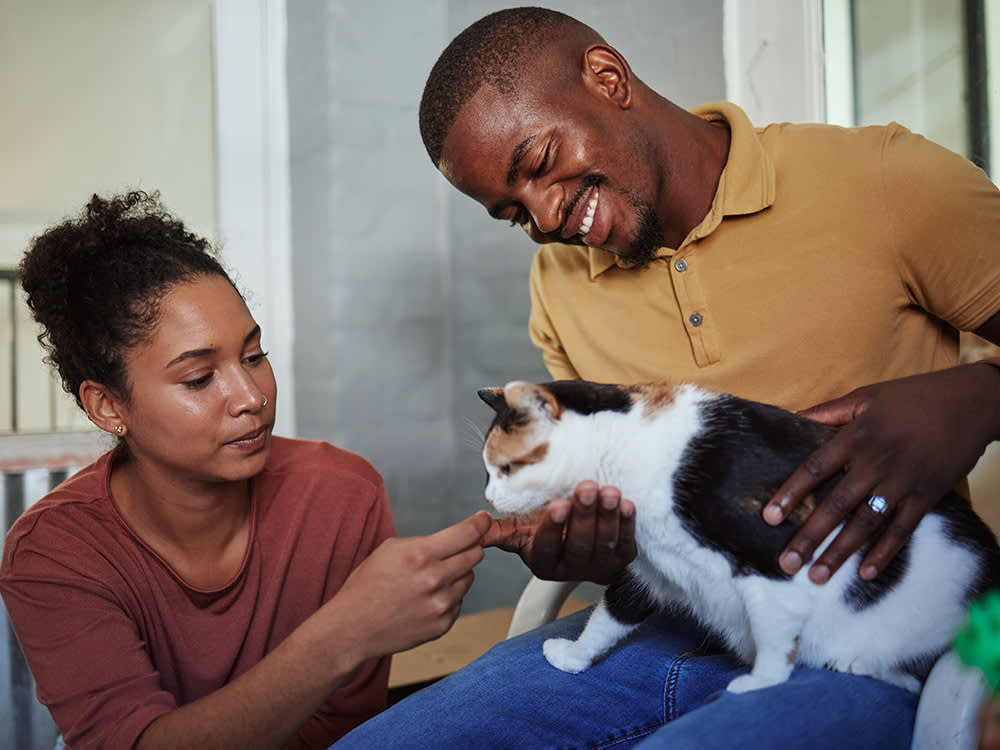
Share Article
Ever since we adopted our cats, Bunny and Dougie, last year, Bunny has preferred my partner.
Bunny will be rubbing her head against heropens in new tab, coming up to her in bed for attention and purring away. I approach, and she’ll either ignore me or she’ll decide she’s had quite enough human interaction.
While she does show me affection from time to time – particularly if I’m opening a pouch of her most-loved food – she definitely has her favourite person. I’ve been relegated to the position of ‘spare human’, and if your algorithm shows you lots of pet content on TikTokopens in new tab, you’ll know that I’m not the only spare human out there. That doesn’t make it any less painful, however, so let’s take a look at why pets sometimes have a favourite human and whether we can do anything to make them warm up to us.
Why do pets often seem to choose just one human?
Cats in particular are often stereotyped as being quite aloof and solitary, but this doesn’t mean they won’t bond with others – regardless of species. “Cats are capable of forming strong bonds with an individual of their own species or that of another, such as their human carer or family dog,” says Amanda Campionopens in new tab, a clinical animal behaviourist. She describes the people or other animals cats bond with as their “preferred individuals”.
Dr Primrose Mossopens in new tab, MRCVS, adds that our pets don’t tend to imprint on a particular person, as such, even if it seems like that’s the case. If your pet seems to prefer one person, “It’s usually because they associate them with more positive experiences – though it can be hard for us to tell what those are!” she explains.
This is echoed by Amanda, who explains that the relationship between a pet and one of their preferred individuals “is based on trust, predictability and positive associations”, particularly where humans are concerned.
My partner and I both work from home most of the week, but I’m almost always at my desk in the home office because I struggle to work in a more relaxed setting. My partner, on the other hand, finds it easy to stay in ‘work mode’ while in bed or on the sofa, so she’s around the cats more often. It stands to reason that an animal who’s already on the wary side may gravitate more to her.
It’d be the same for a dog who’s at home with their family all day. They want to play and be near their humans, and it’s likely that they’ll feel a stronger bond with the one who spends more time with them, plays with them, feeds them and takes them for walks.
“As a clinical feline behaviourist, I see that the preferred individual is usually someone who respects the cat’s boundaries, reads their body language well, and offers comfort, food, or fun without pressure,” says Amanda. Dr Moss agrees, suggesting that animals will often prefer somebody because they spend more time with them, play with them more, or offer more affection in a form they like. With my partner being around more often, this certainly seems to make sense.
In some instances, cats prefer people who don’t offer as much affection, instead valuing their personal space –which could explain why some people who don’t like cats will remark that cats seem to gravitate towards them.
Particularly if you adoptedopens in new tab your pet from a rescue or a shelter, or found them as a stray, their behaviour could be down to their previous experiences. If they were mistreated by a man before they came to you, for example, they might be less inclined to form a strong bond with any men at home.
Before Bunny arrived at the charity we adopted her from, she lived in an alley near a football stadium – we think seeing and hearing loud, (predominantly) male supporters might have contributed to her being less fond of men. Likewise, the rescue is operated by women and doesn’t have as many male volunteers. It’s not just me; when we’ve had visitors, she’ll move towards anyone who isn’t male.
What can the spare human do?
Dr Moss explains that the spare human should pay attention to what the animal prefers about the ‘chosen human’. “That might be offering them a hand to sniff to ’say hello’ before going straight in for strokes, not picking them up if they don’t enjoy it, or, conversely, offering them more attention and play if they value that,” she says.
Amanda suggests simply sitting quietly nearby, giving the animal the opportunity to initiate contact if they’d like to – so there’s no pressure – while she says that “consistency and patience are key”.
For cats, try slow blinkingopens in new tab, too, because in cat body language, it’s used to indicate that they trust you and are feeling relaxed. So, slow blinking at them will show them that you’re relaxed and trust them in turn.
There’s no guarantee that your pet will enjoy these things from the spare human too, and things might not change overnight. For example, a hands-off pet who prefers gentle stroking might take a while to trust that the spare human has changed to their preferred approach.
If you’re the chosen human, you can help by letting the spare human carry out things your pet likes. Dr Moss suggests giving the spare human the opportunity to feed them, give them treats, or play with them – depending on what your pet likes. “They can also help the spare human work out what they do – and don’t – enjoy, from gentle chin rubs to belly strokes,” adds Dr Moss.
“The bonded human can help by sharing positive routines – like grooming or playtime – and ensuring both people interact in a similar, respectful way to build trust across the household,” says Amanda. She explains that, while it can take time to build trust, most pets can learn to feel safe with all of their humans.
Nobody wants to be the spare human – you want your pet to love you just as much as they love your partner or housemate, right? But don’t lose heart. Give your pet plenty of time, let them come to you on their terms but offer them affection if they’d like it, and focus on being the best pet parent you can be in the meantime.

Adam England
Adam England is a lifestyle and culture journalist who has written for publications including PetsRadar, Verywell Mind, People and Healthline. He shares two rescue cats, Bunny and Dougie, with his girlfriend and when he’s not working, he’s visiting his parents’ Golden Retriever, or getting into arguments over music.
Related articles
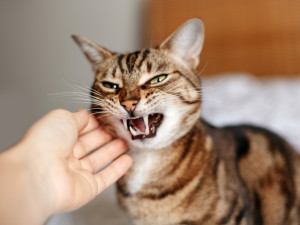
Does Your Cat Hate Your New Partner?
How to help your kitty warm up to your SO
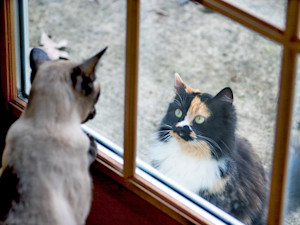
Should My Kitty Be An Indoor Or Outdoor Cat?
All the info you need to make this crucial decision
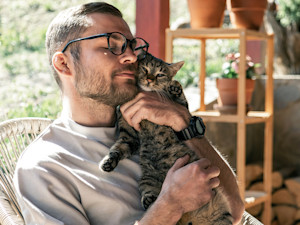
Should You Hug Your Cat?
With consent, of course...
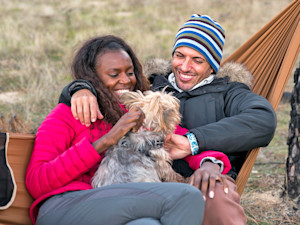
Dating With Pets: Does Your Pet Help (or Hinder) Your Love Life?
Is it time for your own Lady and the Tramp moment?

